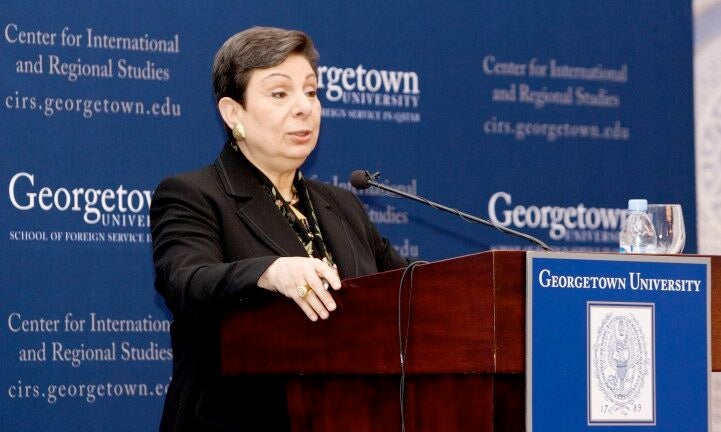Hanan Ashrawi on the Future of Palestine

Professor and Palestinian political activist Hanan Ashrawi shared her insights on the Palestinian struggle when she lectured on “The Future of Palestine” in Doha, Qatar. The lecture was hosted by the Center for International and Regional Studies (CIRS) of the Georgetown University School of Foreign Service in Qatar. Ashrawi is the Founder and Head of the Executive Committee of the Palestinian Initiative for the Promotion of Global Dialogue and Democracy-Miftah, and an elected member of the Palestinian Legislative Council for the Jerusalem District.
SFS-Qatar student Lina Abduljawad introduced Ashrawi to an audience of 400 people at the Diplomatic Club in Doha. Ashrawi noted that the title of her talk, “The Future of Palestine,” was deceptively simple but that such simplicity was not representative of the Palestinian-Israeli conflict, which is mired in various historical, economic, political, and ideological battles that fracture and divide the Palestinian people on a daily basis. In order to know where a nation is headed, she explained, it must come to terms with the past and must go through a “historical redemption,” which is an important part of any reconciliation process. Ashrawi explained that Palestine not only needed international political recognition, but was also in need of its history to be affirmed and recognized as legitimate and one that has been unfairly violated.
Ashrawi noted that Palestine is in a struggle for “devolution of occupation and evolution of statehood,” but that the exact opposite is occurring and is leading to what she terms “the deconstruction of Palestine.” This, she said, is the worst type of humanitarian crisis, as it is a deliberately crafted one. Ashrawi gave details of the daily economic, political, and physical restrictions and challenges that the average Palestinian must endure under Israeli occupation, including the inability for many children to attend schools, and for many adults to reach their lands or places of work. She noted that physical restrictions in the form of checkpoints and the infamous “wall,” ironically, not only restrict the lives of Palestinians, but also prohibit the Israelis form viewing their own horizon, and are, effectively, imprisoning both communities.
In conclusion, Ashrawi called on the international community, and especially Arab countries, to take responsibility for the state of Palestine. She welcomed new ideas and gave several possible solutions that, if honored by all parties involved, will lead to a peaceful existence in the Middle East.
During the question and answer session, Ashrawi gave recommendations for the future and how to begin to work towards a viable and longstanding peace. She called for unconventional approaches to solve the crisis, such as United Nations involvement as a caretaker and mediator or requesting the presence of international ground troops to protect Palestinian rights. Ashrawi argued that the most important aspect of any attempt at conflict resolution was to redress the asymmetrical power relations between the two communities.
Earlier in the day, Ashrawi was invited to speak at an informal luncheon meeting at Georgetown SFS-Qatar, She took questions from Faculty and discussed the nature of the ongoing Palestinian-Israeli conflict and how it might be resolved. In answer to a question regarding how the new U.S. administration might impact the conflict, she noted that, in order to break away from past failures regarding the Middle East peace process, Barack Obama and his administration need to surround themselves with a new team of knowledgeable people and expert policy-makers. This was important in order to formulate a new approach and to create refreshing ideas about how to engage with the problem. It is important, she said, not to resuscitate old teams of experts who have been involved in past mediation efforts, as their energies and ideas are spent. According to Ashrawi, “this is the most important advice to give any new administration.”
Article by Suzi Mirgani, CIRS Publications Coordinator.